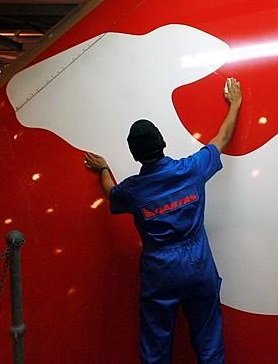Jobs take flight as Qantas culls to cut costs
 Qantas has dropped the axe on hundreds of engineers at its Avalon maintenance base, devastating families in an effort to cut costs.
Qantas has dropped the axe on hundreds of engineers at its Avalon maintenance base, devastating families in an effort to cut costs.
The jobs of about three hundred Qantas workers will now be shipped overseas, reports say, taking the total number of sackings in engineering operations to 1560 over the last 18 months.
The Avalon plant in Victoria will close, leaving the airline with just one facility near Brisbane as its sole maintenance base.
Steve Purvinas, federal secretary of the Australian Licenced Aircraft Engineers Association, says closing Avalon will leave Qantas no choice but to maintain its fleet overseas. Mr Purvinas says safety could be placed at risk, due to a less reliable standard of work at overseas sites.
Qantas Domestic chief executive Lyell Strambi has slammed the union’s claim, saying it was “nonsense”. The airline executive says Qantas’ engineering operations will keep on about 4500 people when the Avalon plant is closed.
The company says with the staged retirement of its 747 fleet, it simply does not have the work for its Victorian engineers.
Qantas will reduce the number of 747 it operates from 15 to 10 over the next three years.
“Over the next four years there would have been up to 22 months with no scheduled maintenance at Avalon,” Strambi said
“No business could afford to continue operating a facility under those circumstances.”
Mr Purvinas, from the aircraft engineers’ union, says from Qantas’ own reports the work still exists – but it will now be carried out in Singapore, Hong Kong or the Philippines.
Reports have indicated that the remaining Brisbane facility cannot physically handle 747-sized aircraft, and Mr Strambi has all but conceded the work will be moved to cheaper outlets overseas.
“If the work isn't done onshore there are certainly plenty of specialist providers of 747 maintenance offshore that we can look at. [But] it is too early to call at this stage,” Strambi said.
The Qantas executive said the chance of finding new positions within the company for the 300 Avalon workers was “negligible”.







 Print
Print